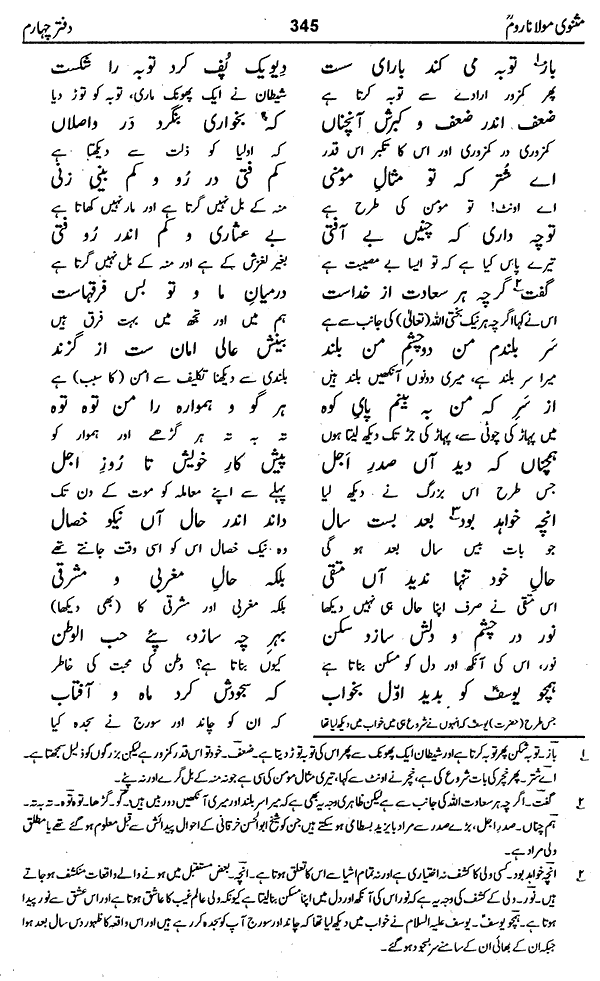Story of the mule's complaining to the camel (and saying), “I often fall on my face when going along, while you seldom do so: why is this?” and the camel's answer to him.
One day a mule saw a camel,
since he had been
put into a stable with him.
He (the mule)
said, “I often
fall on my
face in hill and
road and in
market and street.
Particularly (in descending)
from the top of the mountain to the bottom I come down on my
head every moment from terror.
I come down on my head every instant and
strike my knees (on the ground): by that
slipping I
make muzzle
and knees all bloody.
My pack-saddle and trappings
become awry (lie in disorder)
on my head, and I
always get a beating from the muleteer;
Like the
unintelligent man who,
from corrupt understanding,
in (the case
of his committing)
sin
continually breaks (his vow of) penitence.
Through weakness
of resolution that breaker
of (vows of) penitence becomes the laughing-stock of Iblís in
the
world.
He is always getting
blows on his head from the Unseen,
that man of luckless
nature, from breaking (his vows of)
penitence.
Then again he repents with infirm resolution: the Devil spits (in scorn) and shatters his
penitence.
Weakness on weakness! (Yet) his arrogance is such that he regards
with contempt those
that attain (to God).
O camel, you who art a type of the
true believer do not fall on your face, nor
do you turn up
thy nose (in disdain).
He (the camel)
said, “Though every
felicity is from
God, there are many
differences
between me and you.
I have a high head, my eyes are high: lofty vision is a protection against injury.
From the top of the mountain I see the mountain-foot, I see every
hollow and level, fold by fold, Just as that most noble prince (the perfect
saint) saw his future
destiny till the day
of
death.
That God-fearing man did not see his own destiny only;
nay, the destiny of
(every) inhabitant of the West and East.
The Light makes
its abode in his eye
and heart. Wherefore does it make
(its abode
there)? For love of home.
(He is) like Joseph,
who at first dreamed that
the sun and moon bowed
in worship
before him: After
ten years, nay, more, that which
Joseph had seen came to
pass.
In yours eye that Light is not. Go! You art in pawn to the animal senses.
From weakness
of eye you seest (only) in front of your foot: you art weak and your guide, too, is weak.
The eye is the guide
for hand and foot, for it sees
(both) the right
and the wrong
place.
Another thing is
that
my eye is clearer;
another,
that my nature
is purer,
You art one of the
children of
adultery: without
doubt the
arrow flies crookedly when the bow is bad.”
How the mule declared the replies of the camel to be true and acknowledged his (the camel's) superiority to himself and besought his aid and took refuge with him sincerely; and how the camel treated him with kindness and showed him the way and gave help in fatherly and kingly fashion.
The mule said, “You
have spoken the truth, O camel.” This he said and filled his eye with tears. He
wept awhile and fell at his (the
camel's) feet and
said, “O chosen
of the Lord of men,
What harm will it do if thou,
by (favour of)
your blessedness, wilt
receive me into your
service?”
You have given justice (have
made just amends)
and art saved
from tribulation: you wast
an enemy, you have become one of the
leal.
The evil
disposition was not original (innate) in your person; for from original evil
comes naught but denial.
The borrowed (temporary)
evil is such that
he (in whom it appears)
makes confession and
desires to repent;
Like Adam, whose lapse was temporary: of necessity he showed
penitence at once.
Go, for now you
have grasped felicity, you
have thrown yourself into everlasting fortune.
You have gained (that which is signified by the words) Enter in amongst My servants; you have annexed (the implication of) Enter into My Paradise.
You have made a way for
yourself (to enter) amongst
His servants;
you have gone into Eden
by the secret way.
You wast fire: you
have become light, O noble one;
you wast an unripe grape:
you have become a (ripe) grape
and raisin.
You wast a star: you
have become the Sun.
Rejoice! God
best knoweth the right.”
O Ziyá’u ’l-Haqq (Radiance of God)
Husámu’ddín, take your honey and cast it into the basin
of milk,
To the end that
that milk may escape from
having its savour
corrupted and may gain
much increase of savour
from the Sea of Deliciousness,
(If) it find
a passage into that Sea of honey, no
contamination
will have an
effect upon it. Roar
like a lion, O Lion of God, in
order that that
roar may mount to the seventh
tier (of
Heaven)!
(But) what knowledge (thereof)
has the weary surfeited soul?
How should the mouse know
the roar of the lion?
(Therefore) write your (spiritual)
experiences with
gold-water for the sake of
every one of goodly
substance whose
heart is (deep) as the sea.






No comments:
Post a Comment